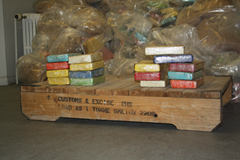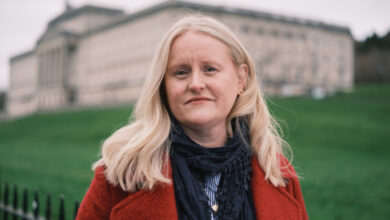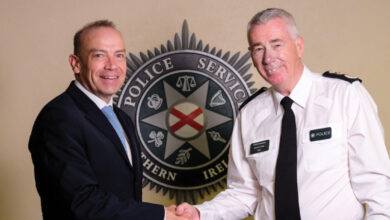Organised crime taskforce strategy
 A new strategy seeks to raise public awareness of organised crime.
A new strategy seeks to raise public awareness of organised crime.
Justice Minister David Ford has launched Northern Ireland’s first organised crime strategy, warning of the dangers to Northern Ireland from international crimes such as human trafficking and the drugs trade.
The Organised Crime Task Force (OCTF) has produced a strategy aimed at making Northern Ireland a hostile environment for organised criminals, helping communities tackle organised crime and informing the public on trends and about its work.
Launching the strategy (January 2012-March 2014), the Justice Minister said that “the threat posed by organised crime gangs is an evolving one and the evidence of international crime gangs operating in Northern Ireland is a worrying development.” He also called on the public to avoid willingly paying for the products of crime. People need to stop thinking that there is little harm in a so-called ‘bargain’.
Activities promised include:
• greater use of online opportunities and social networking to reach particular communities and groups;
• analysis of devolved justice legislation (includes the Proceeds of Crime Act 2002, Serious Organised Crime and Police Act 2005 and Serious Crime Act 2007) and that partially devolved, to ensure its relevance to current threats; and
• an effective OCTF communications strategy.
The strategy states that organised crime is becoming “more sophisticated, innovative and global in nature,” with the presence of foreign gangs increasingly evident. Examples of this are the trades in illegal drugs and human trafficking, with foreign gangs working with local criminals. The internet is presenting “new, and in some cases highly complex, opportunities to commit crimes in Northern Ireland from anywhere in the world,” sometimes from jurisdictions that do not recognise e-crimes in law.
In its most recent threat assessment, published last June, the OCTF identified new trends. Due to the narrowing of fuel prices between North and South, criminal gangs are diversifying into ‘fuel stretching’ whereby cheaper adulterants are added to fuel to bulk it and maximise profits.
Dissidents republicans are involved in a range of organised crime, and a small number are among “the most prolific smugglers of fuel and tobacco products into Northern Ireland.” Some members of the UDA and UVF are active in crimes such as drug dealing and robbery, while the LVF “remains a small, purely criminal organisation with members linked to serious crime for their own, personal benefit.”
Demand for ‘illicit white’ cigarettes is increasing and counterfeit tobacco is being disguised as a smuggled product.
Organised environmental crime has witnessed a new black market for transporting and disposing waste, while local organised criminal gangs are becoming increasingly involved in local cultivation of cannabis (a growing problem throughout the UK and the Republic).
Human trafficking into Northern Ireland is most frequently for sexual exploitation (18 of the 23 victims rescued in 2010-2011) and an increasing number of brothels have links with organised gangs.
Its assessment also pointed to the continuing decline of the ecstasy market here, the reduced level of cash-in-transit attacks compared with a decade ago, and the low impact of organised crime on the social security system.
Several government departments and agencies are represented on the OCTF: the Department of Justice, the Home Office, HMRC, DETI’s Trading Standards Service, the Northern Ireland Environment Agency and the Serious Organised Crime Agency. It also includes the PSNI and the Northern Ireland Policing Board, while business is represented by the CBI, Northern Ireland Chamber of Commerce and the Federation of Small Businesses.
Key threats 2011-2012
• Internet crime
• Fraud
• Money laundering
• Excise and tax fraud (including oils)
• Intellectual property crime
• Armed robbery and cash-in-transit attacks
• Tiger kidnaps
• Drugs
• Counterfeit currency
• Organised immigration crime (including human trafficking)
• Environmental crime
Report sponsored by G4S





